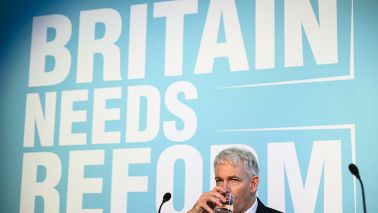David Brooks makes a number of excellent points in his latest column. No surprise there. There’s plenty to dislike, from a policy point of view, about the bills the Democratic Congress in Washington is passing. No surprise there. Then again, there was plenty to dislike about much of the legislation that came out of the Republican-controlled Congress too. Brooks ends his piece with this cute summary:
All true. The cap and trade bill almost certainly contains great nonsense, just like much of the stimulus package before it was also filled with nonsense. That’s what you might expect. Obama has been notably reluctant to choose hills upon which he’s prepared to die. Passing legislation, warts and all, matters more than the detail or, in some cases even the logic, of the legislation. Here, as I’ve suggested before, one can see that Obama and Tony Blair have quite a bit in common. That is, their approach sometimes seems to be something like this: The details on all this can be worked out later. Trust me. Losing a few battles that amount to 1% of what we’re trying to do is no reason for panic, remember that we’re going to win on 90% of the agenda. Trust me. Right?The great paradox of the age is that Barack Obama, the most riveting of recent presidents, is leading us into an era of Congressional dominance. And Congressional governance is a haven for special interest pleading and venal logrolling. When the executive branch is dominant you often get coherent proposals that may not pass. When Congress is dominant, as now, you get politically viable mishmashes that don’t necessarily make sense.
Brooks, of course, is a great admirer of a strong White House, so it’s no surprise that he would prefer Obama to lead Congress, not let himself be held hostage by Congress’s own agenda. And there is obviously something to this, if, that is, by “this”, you mean getting things done. But while one must acknowledge that the Presidency has, shall we say, evolved, it’s still the case that, notionally at least, it is Congress’s role to devise legislation, not the White House’s.
Perhaps the greatest virtue of the American constitution is its sceptical take on politics. The American system was designed to thwart, not enable action and it’s all the better for it. Mencken may well have been right to observe that “Democracy is the theory that the common people know what they want and deserve to get it good and hard” but the genius of the American way of doing things is to cushion that blow by making it pretty darn difficult to actually pass legislation. That’s as it should be. Granted, this will sometimes cause problems of its own, but as a general philosophy it’s not, in itself, a Bad Idea.
Obama is not, alas and by any measure, a modern-day Calvin Coolidge. But if Brooks is right then the problem is not that Obama is letting Congress make the running but that he’s not vetoing legislation. Then again, Obama is an ambitious politician who prefers to advance cautiously. Again, there’s a parallel with Blair.
Still, if the President – and his successors – were to play a lesser role in the legislative process the Republic might be better served. Which is another way of saying that it would be very good if, in this instance at least, this country emulated the Americans and made it more difficult to pass new laws.
[Via Jon Chait who, as you might imagine, has a different take.]






Comments